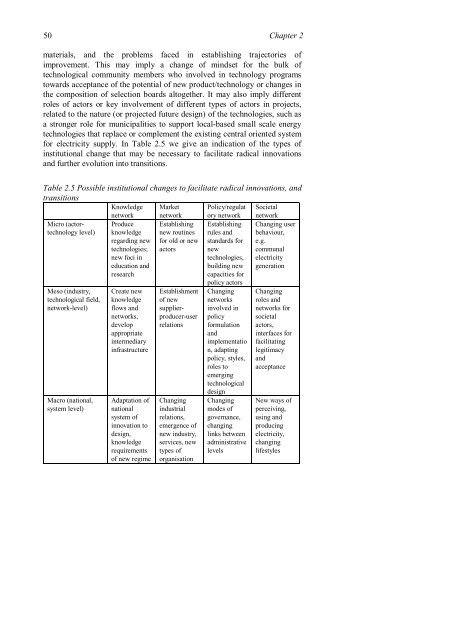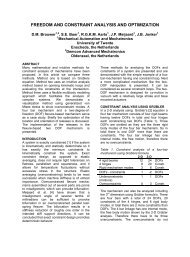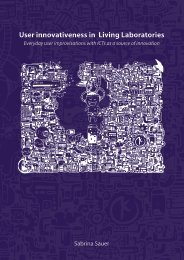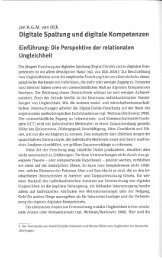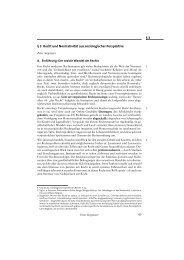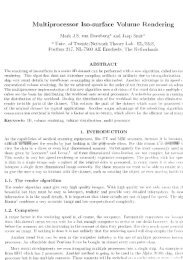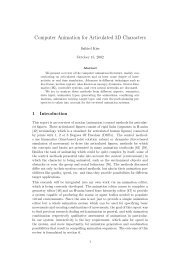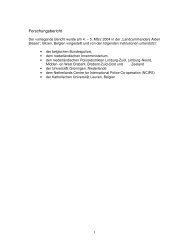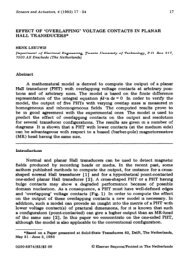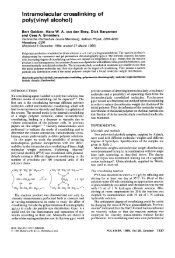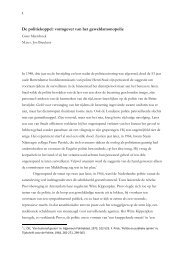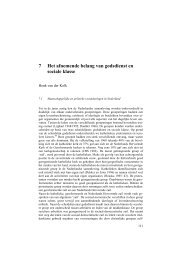Innovation and institutional change: the transition to a sustainable ...
Innovation and institutional change: the transition to a sustainable ...
Innovation and institutional change: the transition to a sustainable ...
You also want an ePaper? Increase the reach of your titles
YUMPU automatically turns print PDFs into web optimized ePapers that Google loves.
50 Chapter 2<br />
materials, <strong>and</strong> <strong>the</strong> problems faced in establishing trajec<strong>to</strong>ries of<br />
improvement. This may imply a <strong>change</strong> of mindset for <strong>the</strong> bulk of<br />
technological community members who involved in technology programs<br />
<strong>to</strong>wards acceptance of <strong>the</strong> potential of new product/technology or <strong>change</strong>s in<br />
<strong>the</strong> composition of selection boards al<strong>to</strong>ge<strong>the</strong>r. It may also imply different<br />
roles of ac<strong>to</strong>rs or key involvement of different types of ac<strong>to</strong>rs in projects,<br />
related <strong>to</strong> <strong>the</strong> nature (or projected future design) of <strong>the</strong> technologies, such as<br />
a stronger role for municipalities <strong>to</strong> support local-based small scale energy<br />
technologies that replace or complement <strong>the</strong> existing central oriented system<br />
for electricity supply. In Table 2.5 we give an indication of <strong>the</strong> types of<br />
<strong>institutional</strong> <strong>change</strong> that may be necessary <strong>to</strong> facilitate radical innovations<br />
<strong>and</strong> fur<strong>the</strong>r evolution in<strong>to</strong> <strong>transition</strong>s.<br />
Table 2.5 Possible <strong>institutional</strong> <strong>change</strong>s <strong>to</strong> facilitate radical innovations, <strong>and</strong><br />
<strong>transition</strong>s<br />
Knowledge Market Policy/regulat Societal<br />
network network ory network network<br />
Micro (ac<strong>to</strong>r- Produce Establishing Establishing Changing user<br />
technology level) knowledge new routines rules <strong>and</strong> behaviour,<br />
regarding new for old or new st<strong>and</strong>ards for e.g.<br />
technologies; ac<strong>to</strong>rs new<br />
communal<br />
new foci in<br />
technologies, electricity<br />
education <strong>and</strong><br />
building new generation<br />
research<br />
capacities for<br />
policy ac<strong>to</strong>rs<br />
Meso (industry, Create new Establishment Changing Changing<br />
technological field, knowledge of new networks roles <strong>and</strong><br />
network-level) flows <strong>and</strong> supplier- involved in networks for<br />
networks, producer-user policy societal<br />
develop relations formulation ac<strong>to</strong>rs,<br />
appropriate<br />
<strong>and</strong><br />
interfaces for<br />
intermediary<br />
implementatio facilitating<br />
infrastructure<br />
n, adapting legitimacy<br />
policy, styles, <strong>and</strong><br />
roles <strong>to</strong><br />
emerging<br />
technological<br />
design<br />
acceptance<br />
Macro (national, Adaptation of Changing Changing New ways of<br />
system level) national industrial modes of perceiving,<br />
system of relations, governance, using <strong>and</strong><br />
innovation <strong>to</strong> emergence of changing producing<br />
design, new industry, links between electricity,<br />
knowledge services, new administrative changing<br />
requirements types of levels lifestyles<br />
of new regime organisation


